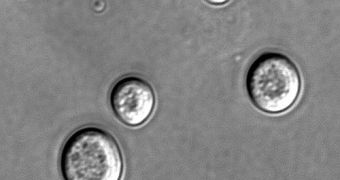Leading researchers from the J. Craig Venter Institute in Rockville, Maryland, and San Diego, California, have recently devised an ingenious way of breaking a bacterium species' invincibility myth, which held that the organisms could not be genetically modified in the laboratory. The method they devised and demonstrated could have far-reaching implications for practical applications, ranging from creating advanced biomaterials and biofuels, to giving birth to artificial life, Nature News reports.
In their experiments, the American scientists extracted a genome from the bacterium Mycoplasma mycoides, and then transferred it into the tough yeast Saccharomyces cerevisiae. This allowed them to finally delete a gene from the M. mycoides genome, something that was impossible to do before, simply because existing tools were not sufficiently developed for the task. The next phase of the plan was to transplant M. mycoides' modified genome into another bacteria species, known as Mycoplasma capricolum.
However, the new host was extremely capable of defending itself, and had the ability to destroy intruding DNA if it did not carry specific chemical tags, called methyl groups. The researchers got past that by destroying an enzyme in the bacteria that triggered the destruction process once foreign genetic material was detected. Also, the team added methyl groups to the already modified genome of M. mycoides, and transplanted it into M. capricolum.
“There are many synthetic-biology applications that need modification of bacteria on a large scale, and yet many organisms that are of interest in this space are not easy to manipulate genetically. So this is really quite a nice advance from a genome engineering standpoint,” Boston University in Massachusetts bioengineer James Collins, who has not been directly involved with the new study, explains.
However, the expert is reserved in terms of what synthetic life may constitute. “My sense of a synthetic organism is one you build from scratch – in that you're not basing the genome directly on an extant natural genome – and we're very far away from doing that,” he concludes.

 14 DAY TRIAL //
14 DAY TRIAL //